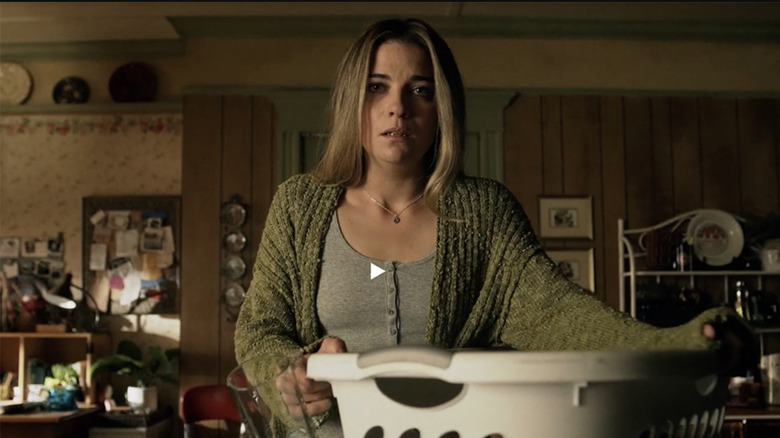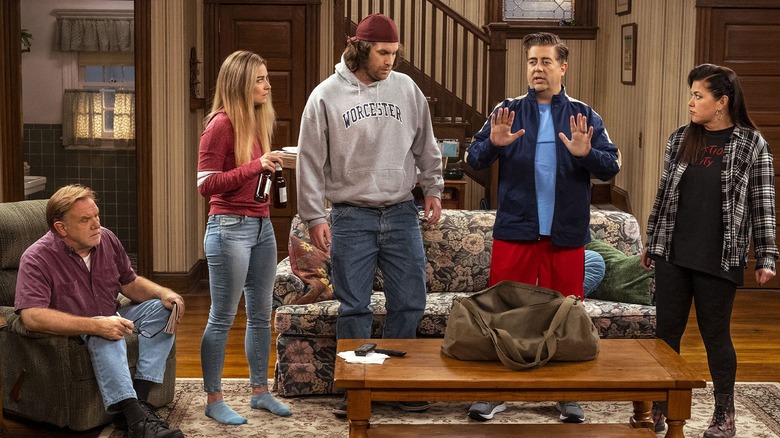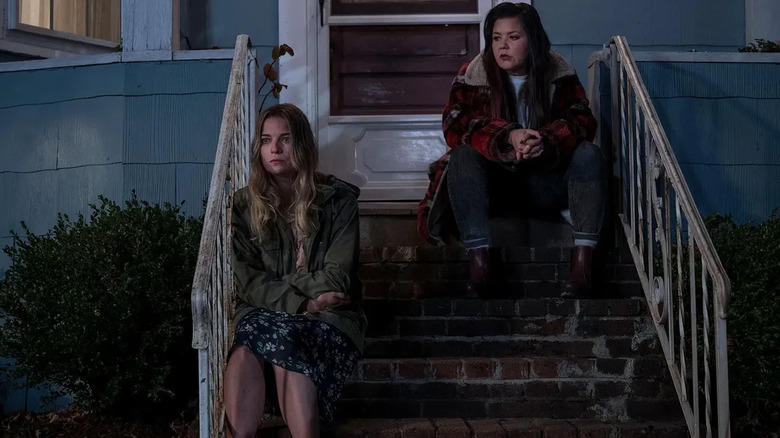The Daily Stream: Kevin Can F*** Himself Is The Satire The American Sitcom Deserves
(Welcome to The Daily Stream, an ongoing series in which the /Film team shares what they've been watching, why it's worth checking out, and where you can stream it.)
The Show: "Kevin Can F*** Himself
Where You Can Stream It: AMC+
The Pitch: How terrible it would be to be married to a man like Peter Griffin or the "King of Queens" himself, Doug Heffernan? That's what Valerie Armstrong set out to answer in her dramedy, "Kevin Can F*** Himself."
Annie Murphy plays Allison McRoberts, née Devine, a desperately unhappy woman in Worcester, Massachusetts. She works at a liquor store alongside her aunt Diane (Jamie Denbo) and is stuck in her dead-end marriage to Kevin (Eric Peterson). On top of being a stereotypical Masshole (he loves the Patriots and Dunkin more than his wife), Kevin is selfish, lazy, and prone to harebrained schemes. And yet, the universe itself loves him. His accomplices are his best friend Neil (Alex Bonifer) and his father Pete (Brian Howe).
On their 16-year anniversary, the camel's back is broken: Kevin foils Allison's wish to move to a better neighborhood, a chance encounter with her high school ex Sam (Raymond Lee) makes Allison realize where things went wrong, and Neil's sister Patti (Mary Hollis Inboden) reveals that Kevin has been raiding his and Allison's savings account for years. With this last straw, Allison decides Kevin has to go, permanently.
Part of the premise is how different scenes are shot. Scenes told from Allison's POV are shot like a prestige TV drama; cold color grading and a single camera. When Kevin's on screen, there's a three-camera sitcom set-up, with a laugh track and over-lighting. This illustrates the difference in perspective and as the series goes on, we learn how this can warp the perception of different characters.
Why it's essential viewing
If you roll your eyes at sitcom humor, there can be something cathartic about "Kevin Can F*** Himself"— Allison is rolling her eyes with you, onscreen. The series' sitcom segments show how Kevin has robbed Allison of her agency, to the point she's not even the center of her own story anymore. The only time she does have that agency is when he's offscreen. Annie Murphy is a very watchable actor; Allison's frustrations are endearing but she's still sympathetic enough that you're never rooting for her to fail (even though she invariably does).
Though initially more apathetic than Allison, Patti is just as disillusioned with her "friend" group and is initially the only one who joins Allison in the real world; men and women literally experience the world differently. That said, the show is more of a meta-text than a social commentary. Indeed, I believe the proliferation of the "schlubby stupid husband" archetype as an object of comedy is more insulting to men than the show's deconstruction of it.
The man in the cast who turns out to be redeemable is Neil, of all people. During the first season, Neil only appears during the multi-cam sitcom portions. Inside them, he's a complete doofus slavishly loyal to Kevin— because that's how Kevin sees him. When we see him in the real world come season 2, he turns out to be much more self-aware than his best friend. Over the course of the season, he grows out of his dependency on Kevin and comes to reject him entirely.
Working in a time crunch
I'll admit pacing isn't always a strength of "Kevin Can F*** Himself." Some episodes spend too much on Kevin's antics, laughing with him when the show should be laughing at him. These episodes wind up employing stock sitcom stories instead of tearing them apart.
The series finale likewise condenses the material that could've filled a season into a single package. In an interview with /Film, Valerie Armstrong acknowledges this, revealing the finale was crafted from ideas meant to fill out the forestalled third season. Looking back on season 2 with hindsight, it can feel front-ended, with a lot of build-ups and not much conclusion. The show's saving grace is that the conclusion itself is a strong one. Instead of running away or wearing a happy mask, Allison finally confronts Kevin with the truth of her feelings. This pushes her narcissistic husband into the real world and we finally see him for who he is.
Even if the road is sometimes bumpy, "Kevin Can F*** Himself" opens with a great hook and sticks the landing.


